When it comes to soundtrack maestros, few are esteemed as Ennio Morricone. The Italian cinematic legend's musical legacy is filled with more high-water marks than seems humanly possible, and not just by reapplying the same old tricks ad nauseam. Amongst his decades-deep catalogue, you'll find everything from chilling horror-score weirdness, to outer-reaching free jazz, to refined classicalism, to buoyant bossa-nova pop and psych-loaded rock, to the very foundations of what became spaghetti western — sometimes all within a single album.
But have a cursory look at his discography on Discogs, and it can be overwhelming, to say the least, with pages upon pages full of a mind-boggling array of albums. Where do you even start? And then where do you go from there?
With soundtracks seeing a massive burst in popularity in recent years, this luckily has led to more than a few Morricone reissues, making his music — some of which was impossibly rare until just recently — once again thrive amongst a booming vinyl resurgence. Really, there's been no better time to open your mind to one of the 20th century's finest composers.
In order to provide some guiding light, we now present our Essential Guide to Ennio Morricone, which not only highlights some of his best work, but let's you know what to avoid and where you should dig even deeper.
Where to Begin:
10. The Cat o' Nine Tails (a.k.a. Il Gatto a Nove Code)
(1971)
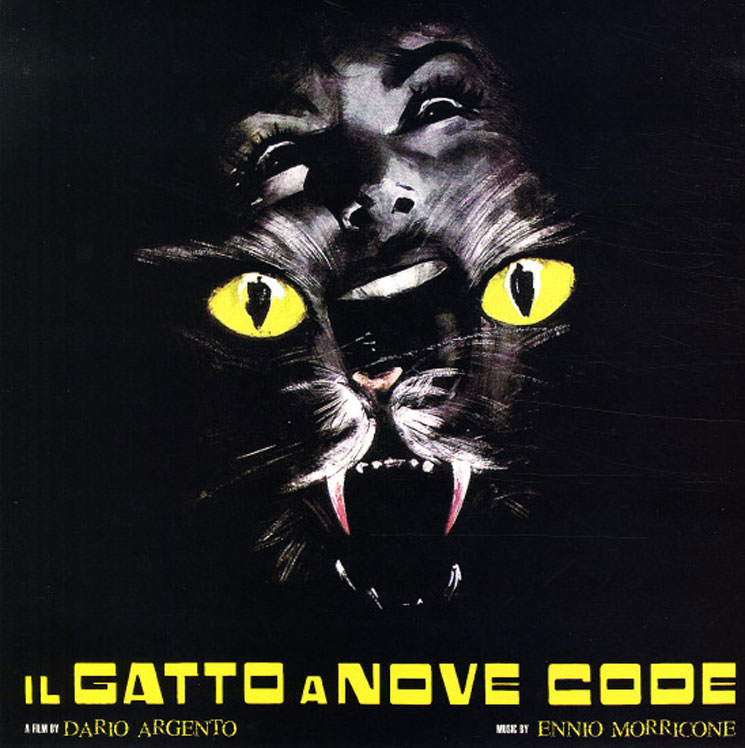
Marking Morricone's second collaboration with Italian horror director Dario Argento, The Cat o' Nine Tails is, hands down, one of the maestro's spookiest moments. Following a beautifully complex spaghetti western-styled opening theme, the score quickly descends into madness, loading on layer after layer of tension via jazz-minded darkness. Complete with bad-news bass lines, flute, wordless female vocals and a lot of atonal jaggedness, it's heavy, to say the least, yet still never gets into Morricone's wild free-jazz space, making it more listenable than you might think. And, hey, a great reissue by AMS is still in print.
9. The Thing
(1982)
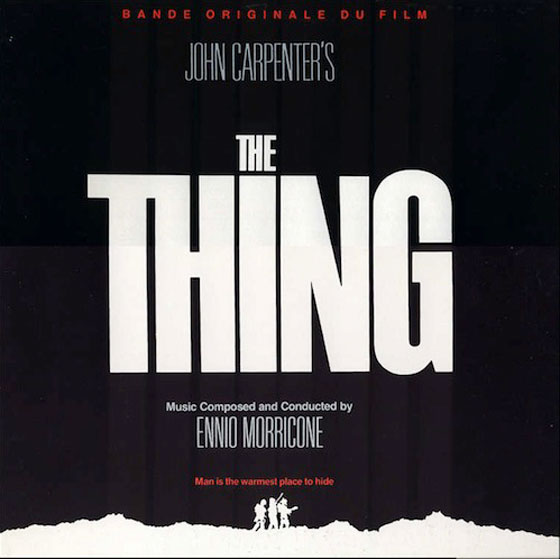
The Thing is a real oddity in the Morricone catalogue. Not only is it one of his most minimal and unsettling works, but it marks one of the few instances when fellow soundtrack legend John Carpenter did not score his own film. What results is an album that equally mixes haunting orchestral pieces with synth-led experimentation, as both become as chilling as the icy terrain where the film takes place. Essentially what you get is Morricone putting on his best Carpenter impression, which is indeed as awesome in practice as it is in theory — even if, as legend has it, Carpenter wasn't pleased with the end results.
8. Slalom
(1965)
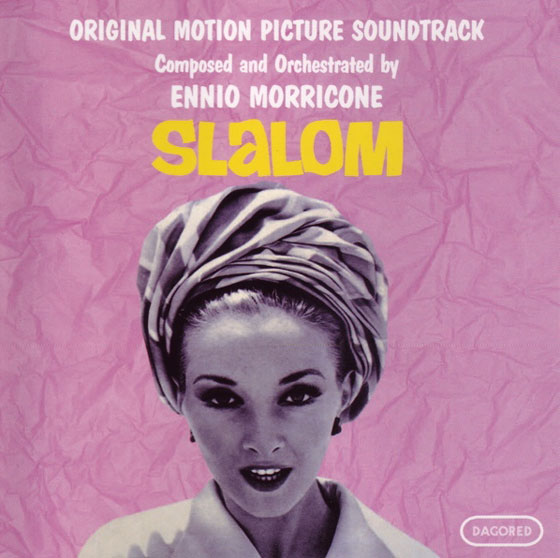
Without question Slalom is one of most Morricone's most joyous pieces of work. Teaming up with frequent scoring partners Bruno Nicolai and Alessandro Alessandroni (both soundtrack heroes in their own right), Morricone pulled out all the stops for this 1965 comedy by director Luciano Salce, offering up everything from driving spy-score zaninesses, to psych-dabbled bubblegum pop to floating bossa nova and lounge-gearing jazz. Throw in some straight-up amazing choir work from Alessandroni's I Cantori Moderni di Alessandroni, fluttering strings and a healthy dose of seriously impressive whistling, and you a record that will crack a smile on the most crotchety of faces.
7. When Women Had Tails (a.k.a. Quando Le Donne Avevano La Coda)
(1970)
If there ever was a musical cure for the Mondays, it's Morricone's When Women Had Tails. Much like Slalom, this is one is all about the good times, despite scoring a best-unseen prehistoric caveman flick. It also once again features MVPs Nicolai and Alessandroni's I Cantori Moderni, with the choir taking on an even more prominent role this time out. The results are splendid, to say the least, washing away all sorrow with a blend of jazzy bossa nova grooves. Light, playful and all-around euphoric, it's a musical pick-me-up of the highest order. Bonus: while once impossibly rare on vinyl, Italian imprint Contempo stepped up last year to give this one a much worthwhile vinyl reissue.
6. Once Upon a Time in the West
(1969)
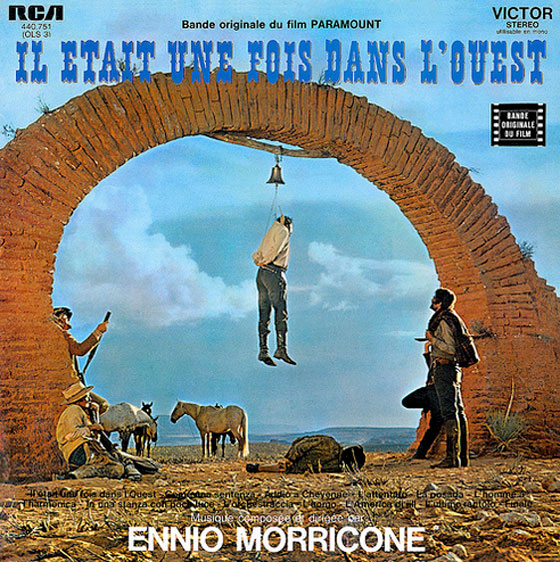
Honestly, you can't go wrong with any of Morricone's work with director Sergio Leone — each one easily warrants a spot on this list. But deserving some special mention is the composer's Once Upon a Time in the West. Like so many of Morricone's work for westerns, it's a surprisingly diverse affair, packing in everything from beautiful choral pieces (directed by Alessandro Alessandroni, no less), to dark orchestral numbers, to seriously mean guitar work-outs. Throughout, though, Once Upon a Time in the West comes with an eerie sort of tone, instilling a sombre mood that has a way of toying with your emotions. Luckily, this one is still relatively easy to get, though in Canada you'll likely find the French version of the soundtrack pictured above.
5. Duck, You Sucker (a.k.a. Giu La Testa)
(1971)
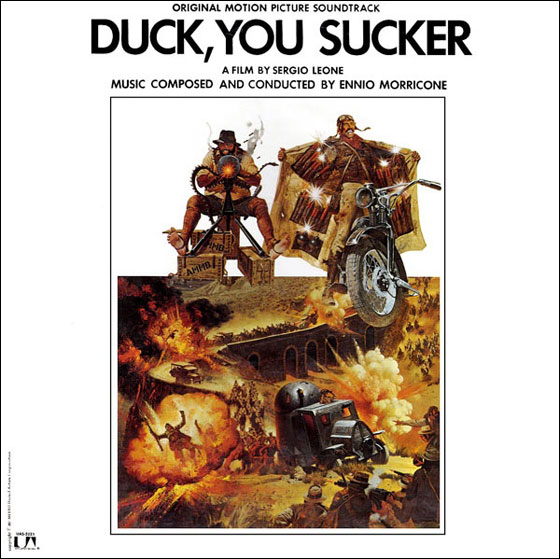
Yet again, here's another Morricone-Leone team-up that's a must-have. Scoring the director's sequel to Once Upon a Time in the West, the soundtrack to Duck, You Sucker is highlighted with its unforgettable main theme, whose bouncing "shom, shom, shom's" and blowing-in-the-wind whistles make it one of the most joyous pieces of music ever. Coming in as a close second are the score's marching band-themed pieces, which instead offer a selection of "wa, wa, wa's" that again would melt the frostiest of hearts. In a way, it's the light to Once Upon a Time in the West's dark. While you're at it, though, you may as well finish off Leone's epic trilogy and grab the great Once Upon a Time in America, which arrived a whopping 13 years later and marks another Morricone classic.
4. Lizard in a Woman's Skin (a.k.a Una Lucertola Con La Pelle Di Donna)
(1971)

It's pretty obvious why UK soundtrack hub Death Waltz decided to reissue Morricone's Lizard in a Woman's Skin last year, as this is a Morricone classic through and through. Serving as the score to master of gore Lucio Fulci's sexually charged and LCD-loaded 1971 giallo classic, it's another record that shows the many versatile sides of Morricone. Funked-up grooves, smooth-pop ballads, psych-damaged freak-outs, atonal free-jazz spookers — it's all here, rarely offering a throwaway moment throughout. In a nutshell, Death Waltz's lavish double-LP reissue, which is packed with a multitude of bonus tracks, is a must.
3. The Good, the Bad and the Ugly
(1966)
Morricone's soundtrack to the Sergio Leone western The Good, the Bad and the Ugly marked one of the composer first truly huge soundtracks, and for good reason. To this day, the theme and its ever-mysterious "whootle" remains immediately recognizable to millions, Morricone fans or not. But beyond that iconic theme, the score offers an impressive amount of variety, with the compositions ranging from the soul-searchingly morose, to the ghostly strange, to the twangy six-string goodness the world would soon come to expect from countless spaghetti westerns. In many ways, The Good, the Bad and the Ugly not only changed the way the world viewed Morricone but soundtracks as whole, and no OST hound should be without out. Luckily, the score has received a pair of vinyl reissues recently and is a relatively easy one to hunt down.
2. The Bird with the Crystal Plumage (a.k.a. L'Uccello Dalle Piume di Cristallo)
(1970)
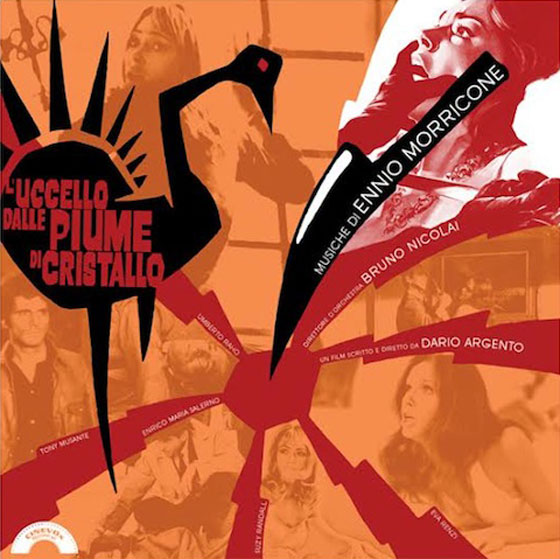
The Good, the Bad and the Ugly may be Morricone's best-known work, but it still doesn't top his 1970 score to the Dario Argento giallo classic The Bird with the Crystal Plumage. From start to finish, the soundtrack is a jaw-dropper, proving to be as haunting as it is beautiful. Blending wooing voices, keyboards and off-kilter orchestral devices, it's masterful display of both Morricone's tender side and his freaky free-jazz persona, with both colliding to create a listening experience that's both subtle and incredibly intense. Oh, and if those whispered "la la la's" of the score's opening moments sound familiar, you heard them sampled on Flying Lotus' You're Dead! Needless to say, The Bird with the Crystal Plumage made a lasting impression, going on to influence countless filmmakers and musicians alike for decades to come. Despite being out of print on vinyl for ages, you can currently grab a copy via AMS.
1. Veruschka
(1971)
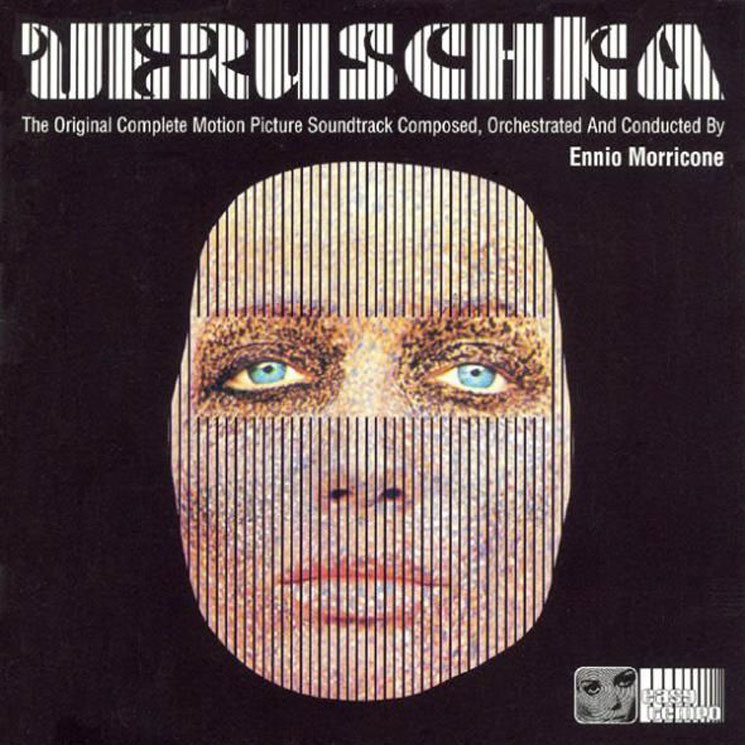
While many have forgotten Franco Rubartelli's 1971 documentary about the world's first supermodel, Veruschka, the same hardly goes for Morricone's accompanying score. Without a doubt, this is Morricone at the height of his powers, perfectly balancing his haunting darker side with his bouncy carefree bossa-nova grooviness and hypnotic brand of psychedelia. Heavy on angelic female vocals — often of the wordless variety — the album is unimaginably soothing. But there's also that aforementioned eeriness, which frequently wiggles its way to the fore via spectral, echo-laden pieces or with even a few more atonal passages. Sweetening the deal even further, the score has been treated to some lavishly executed reissues in recent years, with both Dagored's vinyl re-release and that of the much-missed Easy Tempo adding on an entire LP of essential tracks. If you're looking for the perfect Morricone gateway, this is it.
What to Avoid:
With a catalogue so vast, it goes without saying that not all Morricone records are created equal. While it's hard to write off any as straight-up "bad," there are many out there that do feel uninspired, to say the least. Unfortunately, these are often also the ones most easy found in the discount bin — Moses, Marco Polo, Rampage, Bloodline — and for good reason. Also, while The Mission may be seen as a high point for many (after all it did win several awards back in 1986), it's really not the most exciting Morricone release, especially if you're just starting to test those waters. Oh, and be wary of this insult of a compilation, which doesn't contain the Morricone originals but a series of horrible muzak reinterpretations.
Where to Go from Here:
With the vinyl reissue market booming right now, it's a golden age to be into Morricone, as a new reissue seems to pop up monthly. But you'd also be wise to explore the work of his main collaborators: Bruno Nicolai and Alessandro Alessandroni, both of whom have also been treated to various reissues in recently, mainly via crate-digging UK label Finders Keepers. We also highly recommend exploring Alessandroni's psych-leaning projects Braen Machine and Braen Raskovich, with both reissued recently as well. And if you're up to it, you can dive into the free jazz insanity that is Gruppo D'Improvvisazione Nuova Consonanza, who boasted Morricone as a member.
But have a cursory look at his discography on Discogs, and it can be overwhelming, to say the least, with pages upon pages full of a mind-boggling array of albums. Where do you even start? And then where do you go from there?
With soundtracks seeing a massive burst in popularity in recent years, this luckily has led to more than a few Morricone reissues, making his music — some of which was impossibly rare until just recently — once again thrive amongst a booming vinyl resurgence. Really, there's been no better time to open your mind to one of the 20th century's finest composers.
In order to provide some guiding light, we now present our Essential Guide to Ennio Morricone, which not only highlights some of his best work, but let's you know what to avoid and where you should dig even deeper.
Where to Begin:
10. The Cat o' Nine Tails (a.k.a. Il Gatto a Nove Code)
(1971)

Marking Morricone's second collaboration with Italian horror director Dario Argento, The Cat o' Nine Tails is, hands down, one of the maestro's spookiest moments. Following a beautifully complex spaghetti western-styled opening theme, the score quickly descends into madness, loading on layer after layer of tension via jazz-minded darkness. Complete with bad-news bass lines, flute, wordless female vocals and a lot of atonal jaggedness, it's heavy, to say the least, yet still never gets into Morricone's wild free-jazz space, making it more listenable than you might think. And, hey, a great reissue by AMS is still in print.
9. The Thing
(1982)

The Thing is a real oddity in the Morricone catalogue. Not only is it one of his most minimal and unsettling works, but it marks one of the few instances when fellow soundtrack legend John Carpenter did not score his own film. What results is an album that equally mixes haunting orchestral pieces with synth-led experimentation, as both become as chilling as the icy terrain where the film takes place. Essentially what you get is Morricone putting on his best Carpenter impression, which is indeed as awesome in practice as it is in theory — even if, as legend has it, Carpenter wasn't pleased with the end results.
8. Slalom
(1965)

Without question Slalom is one of most Morricone's most joyous pieces of work. Teaming up with frequent scoring partners Bruno Nicolai and Alessandro Alessandroni (both soundtrack heroes in their own right), Morricone pulled out all the stops for this 1965 comedy by director Luciano Salce, offering up everything from driving spy-score zaninesses, to psych-dabbled bubblegum pop to floating bossa nova and lounge-gearing jazz. Throw in some straight-up amazing choir work from Alessandroni's I Cantori Moderni di Alessandroni, fluttering strings and a healthy dose of seriously impressive whistling, and you a record that will crack a smile on the most crotchety of faces.
7. When Women Had Tails (a.k.a. Quando Le Donne Avevano La Coda)
(1970)
If there ever was a musical cure for the Mondays, it's Morricone's When Women Had Tails. Much like Slalom, this is one is all about the good times, despite scoring a best-unseen prehistoric caveman flick. It also once again features MVPs Nicolai and Alessandroni's I Cantori Moderni, with the choir taking on an even more prominent role this time out. The results are splendid, to say the least, washing away all sorrow with a blend of jazzy bossa nova grooves. Light, playful and all-around euphoric, it's a musical pick-me-up of the highest order. Bonus: while once impossibly rare on vinyl, Italian imprint Contempo stepped up last year to give this one a much worthwhile vinyl reissue.
6. Once Upon a Time in the West
(1969)

Honestly, you can't go wrong with any of Morricone's work with director Sergio Leone — each one easily warrants a spot on this list. But deserving some special mention is the composer's Once Upon a Time in the West. Like so many of Morricone's work for westerns, it's a surprisingly diverse affair, packing in everything from beautiful choral pieces (directed by Alessandro Alessandroni, no less), to dark orchestral numbers, to seriously mean guitar work-outs. Throughout, though, Once Upon a Time in the West comes with an eerie sort of tone, instilling a sombre mood that has a way of toying with your emotions. Luckily, this one is still relatively easy to get, though in Canada you'll likely find the French version of the soundtrack pictured above.
5. Duck, You Sucker (a.k.a. Giu La Testa)
(1971)

Yet again, here's another Morricone-Leone team-up that's a must-have. Scoring the director's sequel to Once Upon a Time in the West, the soundtrack to Duck, You Sucker is highlighted with its unforgettable main theme, whose bouncing "shom, shom, shom's" and blowing-in-the-wind whistles make it one of the most joyous pieces of music ever. Coming in as a close second are the score's marching band-themed pieces, which instead offer a selection of "wa, wa, wa's" that again would melt the frostiest of hearts. In a way, it's the light to Once Upon a Time in the West's dark. While you're at it, though, you may as well finish off Leone's epic trilogy and grab the great Once Upon a Time in America, which arrived a whopping 13 years later and marks another Morricone classic.
4. Lizard in a Woman's Skin (a.k.a Una Lucertola Con La Pelle Di Donna)
(1971)

It's pretty obvious why UK soundtrack hub Death Waltz decided to reissue Morricone's Lizard in a Woman's Skin last year, as this is a Morricone classic through and through. Serving as the score to master of gore Lucio Fulci's sexually charged and LCD-loaded 1971 giallo classic, it's another record that shows the many versatile sides of Morricone. Funked-up grooves, smooth-pop ballads, psych-damaged freak-outs, atonal free-jazz spookers — it's all here, rarely offering a throwaway moment throughout. In a nutshell, Death Waltz's lavish double-LP reissue, which is packed with a multitude of bonus tracks, is a must.
3. The Good, the Bad and the Ugly
(1966)
Morricone's soundtrack to the Sergio Leone western The Good, the Bad and the Ugly marked one of the composer first truly huge soundtracks, and for good reason. To this day, the theme and its ever-mysterious "whootle" remains immediately recognizable to millions, Morricone fans or not. But beyond that iconic theme, the score offers an impressive amount of variety, with the compositions ranging from the soul-searchingly morose, to the ghostly strange, to the twangy six-string goodness the world would soon come to expect from countless spaghetti westerns. In many ways, The Good, the Bad and the Ugly not only changed the way the world viewed Morricone but soundtracks as whole, and no OST hound should be without out. Luckily, the score has received a pair of vinyl reissues recently and is a relatively easy one to hunt down.
2. The Bird with the Crystal Plumage (a.k.a. L'Uccello Dalle Piume di Cristallo)
(1970)

The Good, the Bad and the Ugly may be Morricone's best-known work, but it still doesn't top his 1970 score to the Dario Argento giallo classic The Bird with the Crystal Plumage. From start to finish, the soundtrack is a jaw-dropper, proving to be as haunting as it is beautiful. Blending wooing voices, keyboards and off-kilter orchestral devices, it's masterful display of both Morricone's tender side and his freaky free-jazz persona, with both colliding to create a listening experience that's both subtle and incredibly intense. Oh, and if those whispered "la la la's" of the score's opening moments sound familiar, you heard them sampled on Flying Lotus' You're Dead! Needless to say, The Bird with the Crystal Plumage made a lasting impression, going on to influence countless filmmakers and musicians alike for decades to come. Despite being out of print on vinyl for ages, you can currently grab a copy via AMS.
1. Veruschka
(1971)

While many have forgotten Franco Rubartelli's 1971 documentary about the world's first supermodel, Veruschka, the same hardly goes for Morricone's accompanying score. Without a doubt, this is Morricone at the height of his powers, perfectly balancing his haunting darker side with his bouncy carefree bossa-nova grooviness and hypnotic brand of psychedelia. Heavy on angelic female vocals — often of the wordless variety — the album is unimaginably soothing. But there's also that aforementioned eeriness, which frequently wiggles its way to the fore via spectral, echo-laden pieces or with even a few more atonal passages. Sweetening the deal even further, the score has been treated to some lavishly executed reissues in recent years, with both Dagored's vinyl re-release and that of the much-missed Easy Tempo adding on an entire LP of essential tracks. If you're looking for the perfect Morricone gateway, this is it.
What to Avoid:
With a catalogue so vast, it goes without saying that not all Morricone records are created equal. While it's hard to write off any as straight-up "bad," there are many out there that do feel uninspired, to say the least. Unfortunately, these are often also the ones most easy found in the discount bin — Moses, Marco Polo, Rampage, Bloodline — and for good reason. Also, while The Mission may be seen as a high point for many (after all it did win several awards back in 1986), it's really not the most exciting Morricone release, especially if you're just starting to test those waters. Oh, and be wary of this insult of a compilation, which doesn't contain the Morricone originals but a series of horrible muzak reinterpretations.
Where to Go from Here:
With the vinyl reissue market booming right now, it's a golden age to be into Morricone, as a new reissue seems to pop up monthly. But you'd also be wise to explore the work of his main collaborators: Bruno Nicolai and Alessandro Alessandroni, both of whom have also been treated to various reissues in recently, mainly via crate-digging UK label Finders Keepers. We also highly recommend exploring Alessandroni's psych-leaning projects Braen Machine and Braen Raskovich, with both reissued recently as well. And if you're up to it, you can dive into the free jazz insanity that is Gruppo D'Improvvisazione Nuova Consonanza, who boasted Morricone as a member.




